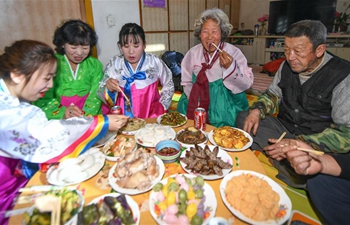by Xinhua writers Qu Junya, Zhang Xin
BEIJING, Feb. 10 (Xinhua) -- Wang Yuanping, a peasant's daughter, was one of China's 43 million rural poor in 2016 with very limited prospects. Now, she is training to become a geriatric nurse in Beijing and expects to start work in 2019.
Working as a geriatric nurse in China's capital would guarantee her a salary of at least 3,000 yuan (474 U.S. dollars) per month, compared to a bare survival in the rural west below the national poverty line of 344 dollars per year.
Such a leap from poverty would take the 18-year-old three years and is quite a shortcut. It is the BN Vocational School that has given Wang this life-changing opportunity of a job in the city and a better life.
"I feel I'm very lucky," Wang said during a class break last December in the school located in the Wangjing area in east Beijing.
GLIMMER OF HOPE
In September 2016, acting upon the advice of a volunteer, Wang sought the help of the BN Vocational School in Chengdu, the capital of Sichuan Province. It is a long way from her hometown, a mountainous village in the neighboring province Gansu in western China.
A boarding school totally free of charge, the BN school is a charity and open only to poor youth like Wang.
Wang said that after her father passed away six years ago, the burden fell to her mother to support the family, which included her grandmother and a younger brother.
Wang's mother now gives her 200 yuan (32 dollars) each month. In the campus shop, Wang can also buy articles for daily use, including toiletries with the BN school coupons devised to reward the students' good performance.
"I can't spend all the money," said the rosy-cheeked teen, who was wearing a clean and dark blue BN uniform. "There are not many things I need to buy myself."
During her break after a German lesson, Wang also told Xinhua that she is studying the foreign language very hard. "I wish I could go abroad, mom would then be very proud of me," she said.
Once they have reached a certain language level, as many as four in her class can go to Germany for a half-year internship, said Zhang Li, head of the BN Beijing campus.
There are 18 students in Wang's class, coming from different parts of China. Their specialty, elderly care and nursing, also involves courses on traditional Chinese medicine and common geriatric diseases.
"I like being with old people, they can be very kind to you if you do something to help them," said Wang.
Her mother suffers from congenital heart disease, Wang added. "When mom is old, I will be able to take better care of her."
It is a long way from Chengdu to Beijing. Being among China's 14 million junior school graduates in 2016, Wang was lucky to become one of the 46 newcomers to the BN Chengdu campus. But it was not by chance that her whole class was transferred to the Beijing campus in 2017.
THE BN WAY
"It's a special arrangement so that the school's resources can be optimized," head of the BN Beijing campus Zhang said.
Elderly care and nursing is a course launched as early as 2015 in the Beijing and Chengdu campuses in anticipation of an increasing number of empty nest elderly people in China's big cities, he said.
"We adapt school courses to the changing demands of the labor market and the enterprises," BN Vocational School head and founder Yao Li said, referring to the enterprises that are partnering with BN and providing teachers, internships and job opportunities.
For example, the Lijiang campus in the southwestern province of Yunnan runs a clinical nursing class as a joint project targeting ethnic minorities. Among the BN vocational courses that vary from campus to campus according to the local resources available, modern city services, especially hotel services, are especially popular.
The school values high flexibility to ensure a quality, practical vocational education for surviving the rapid changes in modern China, Yao said. To this end, it has opted to keep its size small, with no more than 100 students on every campus, she said.
This may partly explain a 100 percent employment rate for its graduates in China, over 5,400 in total since the BN school was founded in Beijing in 2005. "In fact, we have always not enough graduates in supply," Yao said.
An effective education for the students' long-term development in life is also a key factor. Music, literature, foreign languages and history are among the mandatory courses. School practices and activities are designed to encourage the habits of being clean, honest, hard-working and optimistic, as well as to build self-esteem and instill confidence in the student body that includes dropouts and social outsiders.
The BN way has paid off. The school now has campuses in nine Chinese cities, each with an annual operation cost of about 2 million yuan (316,000 dollars). In 2014, BN opened an overseas campus in Angola, Africa, funded by a Chinese company working there. The BN school is largely funded by an annual charity gala, and the most recent one held in January raised 11.4 million yuan (1.8 million dollars) in funds from institutions, enterprises and individuals.
Meanwhile, the BN school is working to distinguish itself as a charity brand in reducing poverty in China.
PART OF NATIONWIDE EFFORT
Among the latest partnerships the BN school has been offered is a joint project with the International Poverty Reduction Center in China, an organization mainly sponsored by the Chinese government and the United Nations Development Program.
The project was started last July and aims to reduce poverty through vocational education, Yao said.
In China, targeted poverty alleviation has been a focus of nationwide efforts over recent years, lifting more than 10 million people out of poverty annually. It is also an economic priority for the next three years. China has vowed to eradicate extreme poverty by 2020, a move contributing to the United Nations 2030 Sustainable Development Agenda.
Vocational education is expected to play a key role in the process and to this end China is opening more vocational schools in poor rural areas.
"Past experience shows vocational education is one of the fastest and most effective means to reduce poverty," Vice Education Minister Sun Yao told an October forum on poverty alleviation held in Beijing.
Therefore it comes as no surprise that the BN approach has been a success story so far.
"We are devoted to providing the best vocational education for the poor kids," Yao said.

















